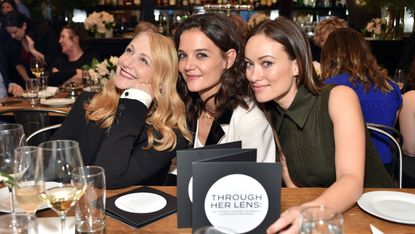

Fixing sexism in an industry as visibly dominated by it as Hollywood is can seem like an impossible problem with very few potential solutions. But film festivals might just be one.
"In the independent film world, we're seeing women get more opportunities to make their first film," says Genna Terranova, director of festival programming at Tribeca Film Festival. "A lot of films that we have are first films."
This year, one-third of the feature films at Tribeca were directed by women.
This year, one-third of the feature films at Tribeca were directed by women. Compare that to the Toronto Film Festival with 26%, Sundance with 25%, Cannes with 15%, Venice with 13%, and Berlin with 11%. (A recent study found that female filmmakers make up 19% of top Hollywood jobs, and only 9% of directors.)
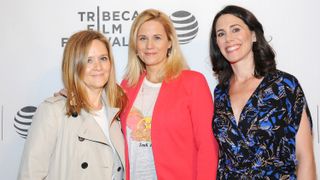
Samantha Bee, Allana Harkin, and Rachel Sklar attend the Tribeca Talks Daring Women Summit.
So, how do you make a film festival "good for women"?
"Every year we want to try different things," says Terranova. "We don't want to do anything just for the sake of doing it."
This time around that meant supplementing the lineup with the Daring Women's Summit, which featured speakers like Samantha Bee discussing feminist comedy and Rosie Perez speaking on the philanthropic work she does to promote women and minorities. Through Her Lens, a three-day workshop for emerging female filmmakers in partnership with Chanel, also took place last fall after TFF 2015.
2016 marks the fourth year of the Nora Ephron Award for female filmmakers at Tribeca, which includes a $25,000 prize. The honor went to Rachel Turrand, who wrote, directed, and edited Adult Life Skills, about a woman struggling with growing up and finding herself.
Stay In The Know
Marie Claire email subscribers get intel on fashion and beauty trends, hot-off-the-press celebrity news, and more. Sign up here.
A post shared by Tribeca (@tribeca)
A photo posted by on
Some initiatives aren't female-focused but benefit women nonetheless, like Tribeca Film Institute's TFI Network, a day of meetings for underrepresented filmmakers to pitch their projects to industry professionals. Director Ingrid Jungermann attended a year ago—and this year, her movie Women Who Kill was a festival selection that went on to win the award for Best Screenplay in a U.S. Narrative Feature Film.
InTerranova is quick to emphasize that women's submissions aren't graded on a curve. "When we're watching movies we're looking for quality," she says.
Terranova is quick to emphasize that women's submissions aren't graded on a curve. "When we're watching movies we're looking for quality," she says. "Women need to be held to the same standard as other filmmakers, or men, so that's the standard we go by. We can certainly give women the platform, but women have to do the work and it has to be better than good work for us to change the numbers."
And it looks like both tactics are working out. When press members pick up their credentials, among other festival materials are handouts listing the films that are directed by women and that are female centric. Movies like All This Panic, a documentary about how teenage girls grow up today, Haveababy, another documentary film on a Youtube competition for a free round of IVF, and All We Had, Katie Holmes' directorial debut about an impoverished single mother trying to raise her daughter well, all give voice to women's stories in new and remarkable ways. Women do quality work, and Tribeca Film Festival promotes it, through measures small and large.
A post shared by Tribeca (@tribeca)
A photo posted by on
Something that often goes overlooked is the fact that the Tribeca Film Festival is led by women—in addition to Terranova, co-founder Jane Rosenthal is executive chair, and Paula Weinstein serves as executive vice president—which shows the advances that can happen when women are in charge. Now that the festival is seeing more first films by women, the goal, according to Terranova, is to have more women making their second and third narratives. "That's harder [than making the first]," she says, "and that's where, hopefully, things will begin to change."
Tribeca Film Festival is led by women—in addition to Terranova, co-founder Jane Rosenthal is executive chair, and Paula Weinstein serves as executive vice president—which shows the advances that can happen when women are in charge.
"I think there's a wave of women's voices that are coming," she adds. "We're very optimistic that these are programs that are necessary until they're not. Hopefully we'll come to that day where we don't have to be talking about percentages of women every year."
Follow Marie Claire on Facebook for the latest celeb news, beauty tips, fascinating reads, livestream video, and more.
I'm the features editorial assistant at Marie Claire. Before working at MC, I spent time in the production department at The New Republic and writing about politics for Bustle. When I'm not writing, you can find me museum-hopping, practicing mediocre yoga, and stalking pugs on Instagram.
-
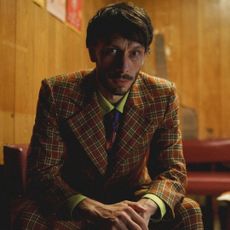 'Baby Reindeer' Is Netflix's Latest Viral Hit—Will It Get a Season 2?
'Baby Reindeer' Is Netflix's Latest Viral Hit—Will It Get a Season 2?The miniseries from Richard Gadd has a very definite ending.
By Quinci LeGardye Published
-
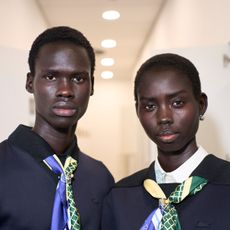 The Best Unisex Perfumes Were Made to Be Shared
The Best Unisex Perfumes Were Made to Be SharedYours, mine, and ours.
By Sophia Vilensky Published
-
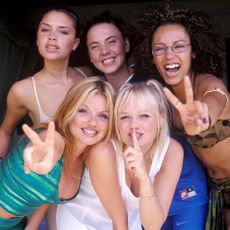 The Spice Girls’ Mini-Reunion at Victoria Beckham’s 50th Birthday Party Is a Precursor for a Forthcoming Tour, Sources Say
The Spice Girls’ Mini-Reunion at Victoria Beckham’s 50th Birthday Party Is a Precursor for a Forthcoming Tour, Sources Say“I’ll tell you what I want, what I really, really want”...is this to be true.
By Rachel Burchfield Published
-
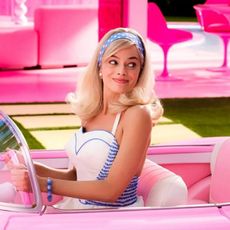 A Definitive Ranking of Margot Robbie’s Top 10 Movie Roles
A Definitive Ranking of Margot Robbie’s Top 10 Movie RolesShe's got a knack for playing complex women.
By Andrea Park Published
-
 The Best Bollywood Movies of 2023 (So Far)
The Best Bollywood Movies of 2023 (So Far)Including one that just might fill the Riverdale-shaped hole in your heart.
By Andrea Park Published
-
 ‘Bachelor in Paradise’ 2023: Everything We Know
‘Bachelor in Paradise’ 2023: Everything We KnowCue up Mike Reno and Ann Wilson’s “Almost Paradise."
By Andrea Park Last updated
-
 Who Is Gerry Turner, the ‘Golden Bachelor’?
Who Is Gerry Turner, the ‘Golden Bachelor’?The Indiana native is the first senior citizen to join Bachelor Nation.
By Andrea Park Last updated
-
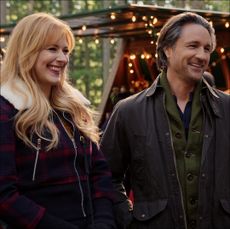 ‘Virgin River’ Season 6: Everything We Know
‘Virgin River’ Season 6: Everything We KnowHere's everything we know on the upcoming episodes.
By Andrea Park Last updated
-
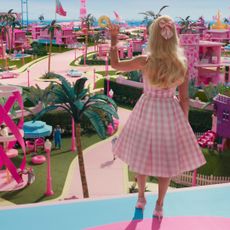 The 'Barbie' Movie Poster Is Already This Year's Most Iconic Meme
The 'Barbie' Movie Poster Is Already This Year's Most Iconic MemeYour daily dose of internet comedy.
By Iris Goldsztajn Published
-
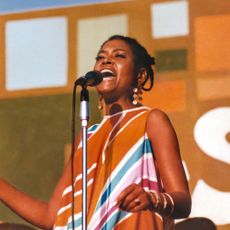 Documentaries About Black History to Educate Yourself With
Documentaries About Black History to Educate Yourself WithTake your allyship a step further.
By Bianca Rodriguez Published
-
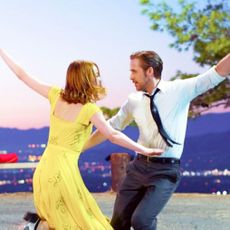 The 60 Best Musical Movies of All Time
The 60 Best Musical Movies of All TimeAll the dance numbers! All the show tunes!
By Amanda Mitchell Last updated